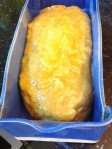For a book of prophecy that isn’t terribly long (only 9 chapters) the Book of Amos really packs a punch. The Prophet Amos does not mince words and in general he is pretty damning of the Children of Israel and their transgressions. It seems, historically, that Amos was the forerunner of all the other prophets. He lived during the reign of King Jeroboam II, around 786-746 BC, and according to the historical record, this may have been the first book of prophecy ever written!
Having said that, it seems like many of the other prophets may have taken pointers from Amos, and that this book of his recorded prophecies sets the stage for many more to come. Therefore I found it surprising how harsh he comes across. Of course, Amos is delivering “the word of God” and therefore the words are not really his, but he offers a really bleak picture of the situation on the ground in terms of the Children of Israel and their transgressions, so much so that it’s hard to find anything that’s really all that redemptive (and appetizing!) until the later chapters.
I was struck by the following two verses in Chapter Four:
“Come to Beth-el, and transgress, to Gilgal, and multiply transgression; and bring your sacrifices in the morning, and your tithes after three days. And offer a sacrifice of thanksgiving of that which is leavened, and proclaim freewill-offerings and publish them; for so ye love to do, O ye children of Israel, saith the Lord GOD.” (Amos 4:4-5)
Amos seems to condemn the Children of Israel for sacrificing “Leavened Bread” – in Hebrew the word is “Hametz” – which is the exact opposite of “Matzah” – the unleavened bread that we eat on Passover. However, I found it strange that the prophet should condemn “leavened bread” so harshly – because it is unclear if the show bread – the “Lechem HaPanim” – was leavened or unleavened, it may very well have been leavened, but it was not sacrificed and perhaps that is the crux.
In Amos chapter eight we come across bread mentioned in a more redemptive light, in a very famous verse (that has been put to music often):
“Behold, the days come, saith the Lord GOD, that I will send a famine in the land, not a famine of bread, nor a thirst for water, but of hearing the words of the LORD.” (Amos 8:11)
So it seems that no matter what kind of bread you eat or sacrifice – leavened or unleavened – what God truly desires from us is to desire him, to desire his words, and so I present to you a form of bread, which I call “Pagan Bread” – to me it was the furthest thing away from Matzah that I could conjure: light and fluffy, sweet and spicy – nothing close to the dry, bland, crisp-bread that we eat on the Passover Holiday. Eat it at your own risk, and make sure to direct your hunger heavenward.
Pagan Bread
1/2 cup warm water
1 Tbsp. honey
1 tsp. cardamom
1 Tbsp. yeast
3/4 cup milk (soy milk or nut milk is fine too – I used hazelnut milk…YUM)
4 Tbsp. olive oil
1 egg
1.5 tsp. salt
4-5 cups flour (I used fine-ground whole wheat)
Mix warm water, honey, cardamom and yeast together in a bowl and let sit for 5 minutes until frothy. Add milk, olive oil, egg, salt and mix. Add 2 cups of flour, mix until combined. Then add 2-3 more cups until the dough is soft but not sticky. Place dough in a lightly oiled bowl and cover with a tea towel (or place entire bowl inside a plastic bag). Let rise about an hour or until dough has doubled in size. Punch down and knead into desire shape. Brush top with honey. Bake at 350 degrees F (175 degrees C) until golden brown – about 30 minutes (I used a toothpick to make sure it was done – if dough sticks to the toothpick, allow the bread to bake more).





